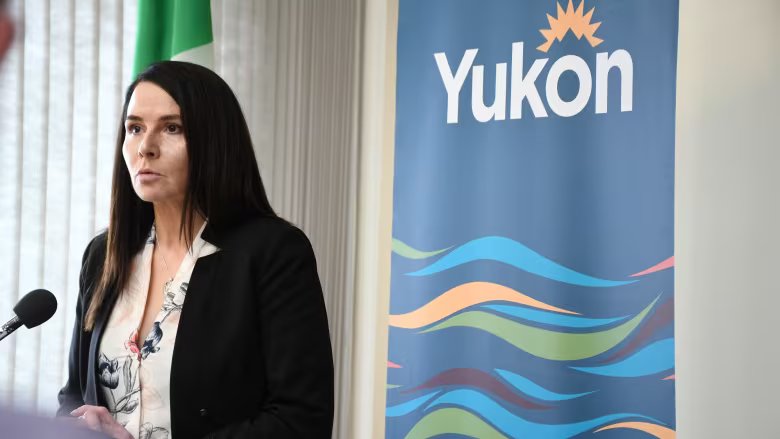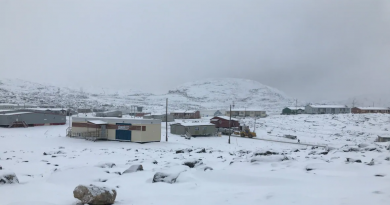Yukon education department pauses change to educational assistant allocation process

The Yukon education department has paused a controversial change to how it allocates educational assistants after backlash from local organizations.
Education Minister Jeanie McLean sent a letter to the Yukon Association of Education Professionals (YAEP) announcing the pause late last week and confirmed the news to reporters at the legislative assembly on Monday.
While McLean had previously defended the change, describing them as minor and bureaucratic in nature, she said Monday that she now wants to “hear our partners.”
“The work that we’ve undertaken is that important, that we want to really take the time to ensure that we’re hearing the concerns and to work to get folks back onto the same page,” she said.
The YAEP was one of five organizations — the others being the LDAY Centre for Learning, Autism Yukon, the Yukon First Nation Education Directorate and the Association of Yukon School Councils, Boards & Committees — that sent a letter to McLean earlier in the month condemning the change and that fact that they hadn’t been consulted about it.
The four other organizations also received similar letters to the YAEP last week, except signed by deputy minister Mary Cameron.
The change would have required schools to fill out forms to apply for educational assistants for the 2024-2025 school year, with one assistant assigned to every class from kindergarten to Grade 4. Additional educational assistants would then be assigned to individual students as needed, with a student’s eligibility for one-on-one support to be determined via a new scoring matrix.
The letter to McLean aimed that new scoring matrix, arguing that it doesn’t properly evaluate a student’s needs and could result in students who are currently assigned one-on-one educational assistants not being eligible for them anymore in the new school year. It also criticizes the “arbitrary base allocation” of educational assistants to classrooms without taking into account the needs of each class, and that the government apparently made the change based on a report from a consulting firm that hasn’t been made public yet.
McLean said the education department is setting up meetings with the organizations that signed the letter to discuss their concerns.
She also said she wanted to “unpack” why the organizations felt blindsided by the change and “where folks feel the communication may have broken down” and “where things went wrong.”
“I want to understand directly what happened there in terms of you know why folks felt the need to write a letter laying out those concerns when we’ve been working closely with all of our partners,” she said.
“I met with one of the stakeholders the day before we received this letter and there was no indication really that there was a direct issue that was going to be presented in a letter like this the next day.”

‘I feel that we wasted a lot of time with this’
YAEP president Ted Hupé, in a separate interview, said he was “pleased” the department had paused the change. While he acknowledged the invitation to meet with the department, he said that the five organizations who signed the letter would not meet with education officials one-on-one — only all together.
He also said the organizations want to know what was in the consulting firm’s report that led to the change, and why the change was made without input from any of them.
“We feel that that’s very important,” Hupé said. “That needs to be made clear to the stakeholders so that we can use that information to enhance the conversations that we will ultimately have.”
“I just hope the Department of Education’s leadership will take this exercise and these circumstances to heart and really take the concept of consultation seriously because that’s really what we all desire — good consultation, good back-and-forth, good dialogue so we can help children,” he added.
“The hard work begins now and I feel that we wasted a lot of time with this.”
The leaders of the Yukon’s opposition parties, meanwhile, also told reporters they were pleased that the education department was pausing the change, but continued to question why the change was made in the first place without consulting local organizations.
The Yukon Party’s Currie Dixon claimed the “challenges” around the change were “just the symptom of a larger problem.”
“There seems to be a growing rift between [McLean] and a number of these education stakeholders,” he said.
“I think the minister needs to do a lot of work to repair the damage that’s been done between her, her department and the educational community.”
NDP leader Kate White agreed.
“I’m hopeful that there’s an opportunity to repair the damage that’s been done and to also fix a policy that obviously wasn’t going to do what it should be, which is supporting students,” she said.
Related stories from around the North:
Canada: Honorary degree caps a career spent preserving, promoting, Dene culture, language, CBC News
Finland: Sami Parliament in Finland agrees more time needed for Truth and Reconciliation Commission preparation, Eye on the Arctic
Greenland: Danish PM apologizes to Greenlanders taken to Denmark as children in 1950s, Eye on the Arctic
Norway: Can cross-border cooperation help decolonize Sami-language education, Eye on the Arctic



